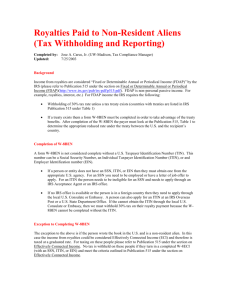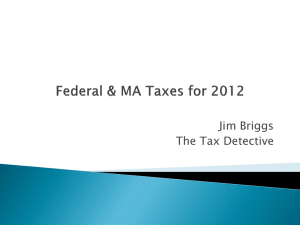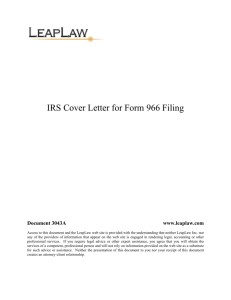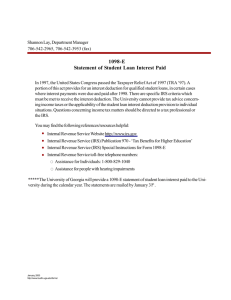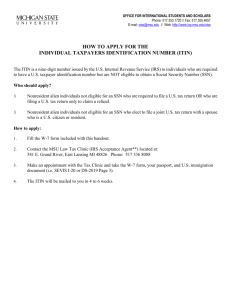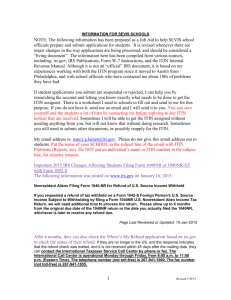CJ Workshop: Resources for Spanish Speakers Filing Taxes
advertisement
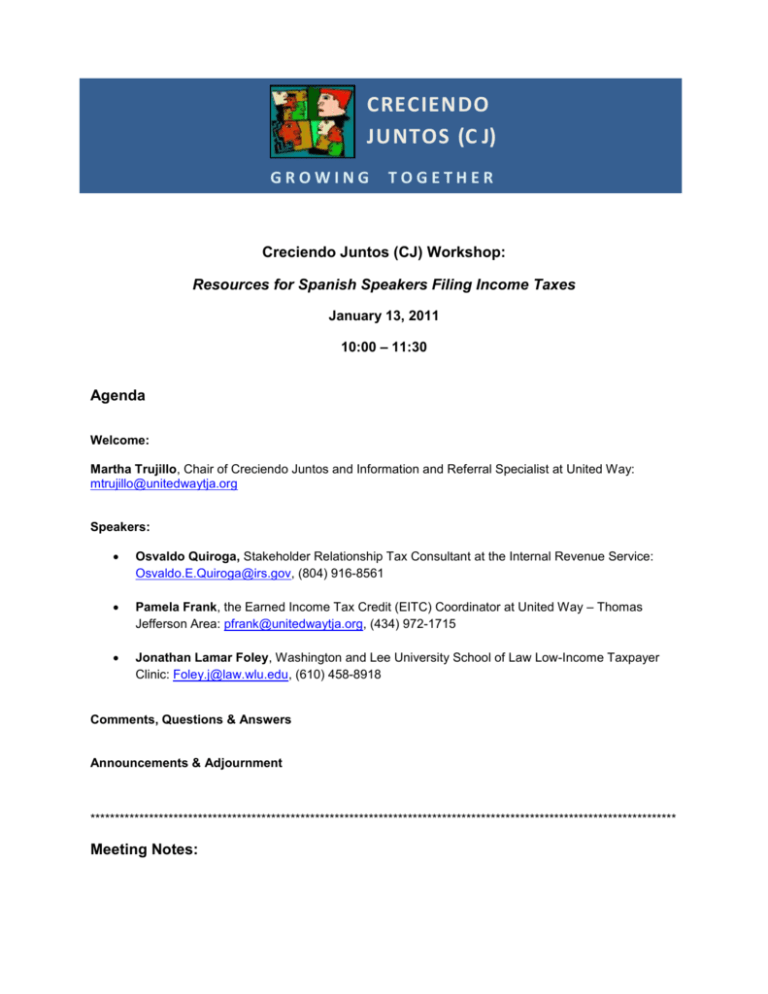
CRECIENDO JUNTOS (C J) GROWING TOGETHER Creciendo Juntos (CJ) Workshop: Resources for Spanish Speakers Filing Income Taxes January 13, 2011 10:00 – 11:30 Agenda Welcome: Martha Trujillo, Chair of Creciendo Juntos and Information and Referral Specialist at United Way: mtrujillo@unitedwaytja.org Speakers: Osvaldo Quiroga, Stakeholder Relationship Tax Consultant at the Internal Revenue Service: Osvaldo.E.Quiroga@irs.gov, (804) 916-8561 Pamela Frank, the Earned Income Tax Credit (EITC) Coordinator at United Way – Thomas Jefferson Area: pfrank@unitedwaytja.org, (434) 972-1715 Jonathan Lamar Foley, Washington and Lee University School of Law Low-Income Taxpayer Clinic: Foley.j@law.wlu.edu, (610) 458-8918 Comments, Questions & Answers Announcements & Adjournment ************************************************************************************************************************ Meeting Notes: Introduction by Martha Trujillo, Chair of Creciendo Juntos and Information and Referral Specialist at United Way: mtrujillo@unitedwaytja.org In many other countries, such as Mexico, your employer files your taxes for you and individuals are not required to do anything in regards to taking care of their own taxes. Coming to the US, it is difficult for immigrants to learn how to file their taxes, especially if they never had to do it in their own country. The purpose of this workshop is to help participants learn how to get tax credits and assistance for Spanish speakers and other Virginia residents filing their state and federal income taxes. Presentations: Osvaldo Quiroga, Stakeholder Relationship Tax Consultant at the Internal Revenue Service: Osvaldo.E.Quiroga@irs.gov, (804) 916-8561 View Osvalso Quirog’s PowerPoint Presentation on the Individual Taxpayer Identification Number at: http://www.cj-network.org/cjinitiatives/2011/2011JanITIN.ppt The IRS uses Individual Taxpayer Identification Numbers (ITIN) to help everyone file their taxes. People without a social security number are also required to file their taxes, and those without a social security number can request an ITIN in order to file their taxes. You obtain an ITIN by filling out the form W-7, available in Spanish, attaching proof of identity and foreign status (passport is ideal, but there are other documents that will qualify, listed in IRS publication 1915). Common Application Errors: No tax return form is attached, forms aren’t signed, foreign address is not provided, proper documentation is not attached, application is mailed to the wrong address (It should go to the ITIN PO Box, not the IRS tax filing address) Tax payers can get help completing their W-7 from publication 1915 Understanding your IRS ITIN, calling the IRS at (*00) 829-1040, visiting an IRS Taxpayer Assistance Center, a VITA site, a tax professional (not free), or an IRS approved free tax consultant, or look for a local agent on the IRS website: www.irs.gov. Certified Acceptance Agents work with the IRS to interview clients, determine eligibility for a SSN, review their documentation, preparing the W-7, and submitting all forms The ITIN is intended for federal tax purposes only and does not change a person’s legal status, make them eligible for a work permit or permanent status, nor entitle applicants to claim the Earned Income Tax Credit. Questions: Does this information stay within the IRS because people without legal status would be very concerned about filing their taxes and identifying themselves? o Response: Their information cannot be shared with ICE. Some people who work but don’t have a SSN make one up in order to work. When they get their W-2 with a false SSN number, what do they do? o Response: They can submit their W-2 and tax forms and W-7, and if they are assigned an ITIN and owed any money they will receive it, and they will be able to use the ITIN for future tax forms. Even those who have not filed taxes for a number of years can follow this process and receive back taxes they are owed (up to three years). o If a person files their taxes with a fictitious SSN their tax return will not go through and their information is filed as an invalid number. It is illegal to file a return with a fictitious SSN number. o If tax return money is not claimed, it remains unclaimed in an account and will eventually be returned to the government once it’s too late for an individual to claim their back tax returns Why should undocumented residents file their income taxes? o From the IRS perspective, if someone has a legal obligation to file their taxes, then they must. As far as benefits go, if you are applying for residency you will be required to show proof of paying taxes for several years. They can also often receive a refund of the taxes they have paid over the year, so it can be financially beneficial. Pamela Frank, the Earned Income Tax Credit (EITC) Coordinator at United Way – Thomas Jefferson Area: pfrank@unitedwaytja.org, (434) 972-1715 View Pamela Frank’s PowerPoint Presentation on the Earned Income Tax Credit at: http://www.cjnetwork.org/cjinitiatives/2011/2011JanEITC.ppt Pamela’s role is to oversee the EITC program at United Way. A number of organizations in Charlottesville offer free tax assistance, and since 2007 there has been a local Coalition of organizations to help people file their taxes. There are many free tax preparation sites around Charlottesville and surrounding counties. Volunteer Income Tax Assistance (VITA) sites are for individuals/households making less than $49,000 a year. The Coalition’s goals are to help as many people file their taxes, claim the EITC, and help people avoid paying expensive fees for filing their taxes. Questions/Comments: According to the IRS 25% of people eligible for the EITC are not claiming it PHA does a lot of work on financial literacy and getting people away from predatory lending. How can we measure our success to know if we’re really helping people get the free assistance available to them? o The UVA Credit Union’s VITA sites are steadily growing –an 18% increase last year. They’re aiming for a 20% increase this year. The Coalition also exists to help increase financial literacy –they’re not just filing taxes for people but also offer training to help families become self sufficient Do you think the paid preparers generally know to promote the EITC and is there an incentive for them to do so? What are the downsides of using a paid preparer to file your taxes? o It’s in the interest of the tax payer to claim that refund, so people should go to a preparer who will at least get you as much money back as possible. o Some people also use paid preparers because they can get an advance on their refund (at a cost), or they think they will get their actual refund sooner, but United Way uses efile and people get their refunds in as little as four days, at most ten. Paid preparers will sometimes offer a loan on their returns, which will come at a cost, both from the bank and from the preparer. It’s really beneficial to use a free preparer service to save on these fees, but it’s difficult to compete with the marketing strategies of paid preparers and businesses. Many online tax filing programs also do not properly claim the credits people are allowed. Expanding awareness about the programs available is very important. o It’s a challenge to break the habit cycle of using paid tax preparer services, particularly for those who give loans for the holidays. The VITA sites are opening as soon as they can (mid January), but it’s hard to convince people to wait. You cannot submit a tax return to the IRS until January 14, so a paid preparer that offers to submit your taxes before this is not actually filing your taxes, just giving you a loan on your return. Martha Trujillo at United Way is the only bilingual (English/Spanish) free tax preparer available in the Charlottesville area, and she has people coming from all over the area seeking her help. She is seeking bilingual volunteers to help her with the hundreds of Spanish speaking families that use United Ways tax services. United Way is also the only site within the Coalition where someone can file for an ITIN. Pamela and Martha are now both Certified Acceptance Agents to file ITIN applications, which speeds up the process by several weeks. It’s best to encourage clients without a SSN to apply for an ITIN as early as possible. Spanish speakers can call Martha to start the ITIN application process. There are flyers about United Way’s free tax services –please distribute them and hang them in your offices. Jonathan Lamar Foley, Washington and Lee University School of Law Low-Income Taxpayer Clinic: Foley.j@law.wlu.edu, (610) 458-8918 View Jonathan Lamar Foley’s PowerPoint Presentation on Washington and Lee’s Low-Income Taxpayer Clinic at: http://www.cj-network.org/cjinitiatives/2011/2011JanWLTaxClinic.ppt Jonathan is a third year law student and an intern in the Low Income Taxpayer Clinic. The biggest issues they see are insufficient income reporting, incorrect filing status, not having supporting documents, not paying what they owe on their returns, claiming too many exemptions, claiming unearned credits, or failing to file taxes at all. Taxpayers often come to the clinic once they’ve been contacted by the IRS with a notice of deficiency or have already seized their bank account. There are low income tax payer clinics all over the country; W&L’s is in Lexington and is supported and funded by the IRS. o They can only accept low income clients ($20k -$60k). o They provide translation services Types of assistance they offer include: responding to IRS notices, failure to file returns, filing for EITC, innocent spouse relief, self-employment issues, settlements of debt, collections alternatives, audits, appeals, tax court representation, liens and levies, and identity theft in case someone has been using your SSN or ITIN. They are happy to travel to Charlottesville to meet with clients!
